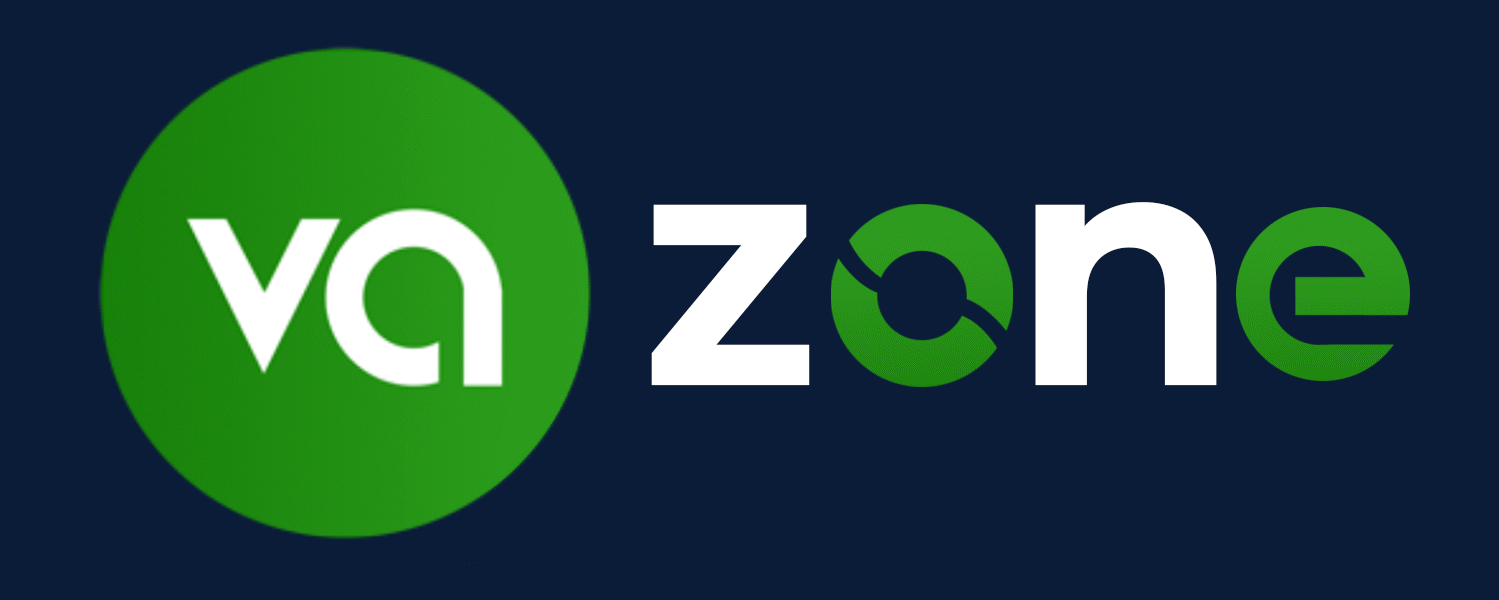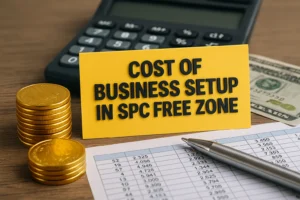
VAZONE Expert Guide
What is the Difference Between Mainland and Free Zone License?
Realizing the difference between Mainland and Free Zone licenses is important for entrepreneurs in the UAE. Mainland business licenses allow free trade within the UAE, while Free Zone licenses offer tax benefits and 100% foreign ownership. Choosing the right option depends on business needs, operational flexibility, and legal requirements. Analyze the key benefits and regulations to make a knowledgeable decision.

Table of Contents
Difference Between Mainland and Free Zone Licenses
The UAE is a global hub for trade, innovation, and investment, making it a top choice for business executives worldwide. When starting a business in the United Arab Emirates, one of the first questions a foreign businessperson faces is about which jurisdiction to choose: Mainland vs. Free Zone License in the UAE.
Understanding the difference between mainland and free zone licenses is crucial to making the right decision for your business. This guide will explore the key features, benefits, and differences between mainland and free zone licenses, along with FAQs to help you make an informed choice.
What is a Mainland License?
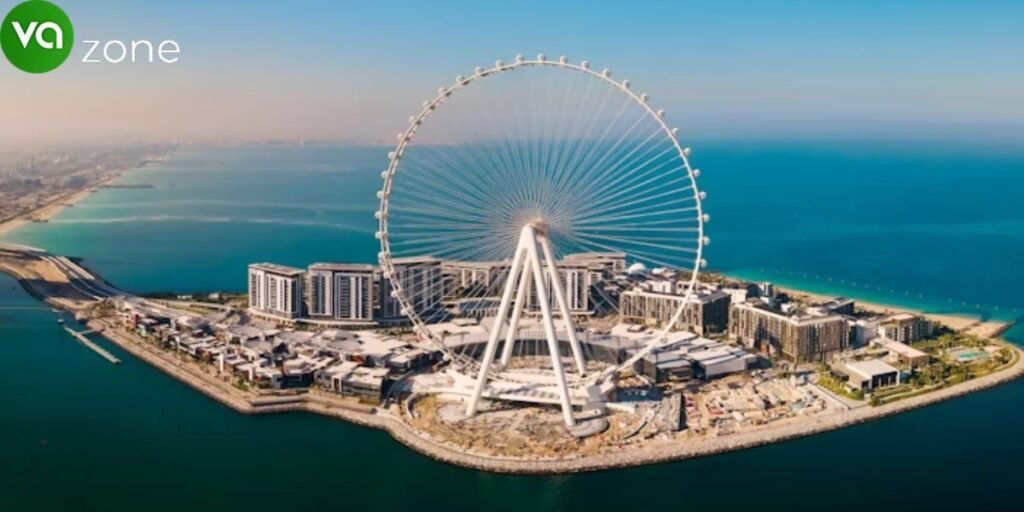
A Mainland License is a type of business license issued by the Department of Economic Development (DED) in the respective emirate of the UAE (such as Dubai, Abu Dhabi, or Sharjah). It allows businesses to operate anywhere within the UAE, including the mainland areas of all seven emirates. This type of license is ideal for companies that want to target the local UAE market, engage in government contracts, or establish a strong presence in the region.
Need help choosing the right license? Contact VA Zone now!
Key Features of a Mainland License

- Unrestricted Market Access:
- Businesses with a mainland license can operate freely across the UAE, including in local markets, and can also trade internationally.
- Local Sponsorship Requirement (for some activities):
- Historically, mainland companies required a UAE national to hold 51% ownership. However, recent reforms now allow 100% foreign ownership in over 1,000 business activities across sectors such as manufacturing, trading, and service industries. However, strategic sectors like oil, gas, and defense still require local sponsorship. It’s crucial to check the updated list of eligible activities with the Department of Economic Development (DED) before proceeding.
- Government Contracts:
- Mainland firms are suitable to bid for and secure government contracts, which can be a powerful advantage for businesses in industries like construction, healthcare, and infrastructure.
- Office Space Requirements:
For mainland businesses, having a physical office area is mandatory, with a minimum of 200 sq. ft. as per DED regulations. However, the exact requirements vary across emirates. For instance:
- Dubai: Minimum of 200 sq. ft. of office space for a trade license.
- Abu Dhabi: Some business actions allow virtual offices in certain free zones.
- Sharjah: Office requirements depend on business activity and type of license.
This ensures compliance with UAE regulations.
- Visa Allocation:
- There are no limitations on the number of visas a mainland company can obtain. However, the visa allocation is tied to the size of the office space.
- Wide Range of Business Activities:
- Mainland licenses allow businesses to employ in a broad range of commercial, industrial, and professional activities, subject to approval from the DED.
- Global Expansion:
- Mainland companies can easily expand internationally while maintaining a strong presence in the UAE.
What is a Free Zone License?

A free zone license is a type of business license issued by one of the UAE’s many free zones, which are designated areas designed to promote foreign investment and international trade. Free zones offer businesses 100% foreign ownership, tax exemptions, and customs benefits, making them an attractive option for entrepreneurs and companies focused on global trade and services.
Free zones are governed by their regulatory authorities and operate under specific rules and regulations tailored to their respective industries. Each free zone caters to specific sectors, such as technology, media, logistics, healthcare, and manufacturing, providing specialized infrastructure and support.
Need help choosing the right license? Contact VA Zone now!
Key Features of a Free zone License

- 100% Foreign Ownership:
- Free zone companies allow 100% foreign privilege, meaning no local sponsor or partner is required.
- Tax Exemptions:
- Companies in free zones enjoy 100% exemption from corporate and personal taxes, as well as customs duties on imports and exports.
- Restricted Market Access:
Free zone companies can work within the free zone and internationally but cannot directly conduct business in the UAE mainland without a local distributor or agent. However, there are workarounds, such as:
- Appointing a local distributor to handle mainland sales.
- Opening a branch office on the mainland (which requires additional licensing).
- Partnering with a mainland company for joint ventures.
- Applying for a dual license in certain free zones that allow partial mainland access (e.g., Dubai Multi Commodities Centre – DMCC and Abu Dhabi Global Market – ADGM).
- Flexible Office Solutions:
- Free zones offer cost-effective office resolutions, including virtual offices, shared workspaces, and warehousing facilities.
- Industry-Specific Zones:
- Many free zones cater to specific industries, providing tailored infrastructure, networking possibilities, and regulatory support.
- Streamlined Setup Process:
- The setup process in free zones is generally faster and more straightforward compared to mainland companies, with fewer government approvals required.
- Customs Duty Benefits:
- Goods imported into or exported from the free zone are exempt from customs duties, provided they remain within the free zone or are re-exported.
Mainland vs. Free zone: Essential Differences

Understanding What is the difference between mainland and Free zone licenses? Is essential for choosing the right setup for your business. Here’s a detailed comparison:
| Aspect | Mainland License | Free Zone License |
|---|---|---|
| Ownership | 51% local ownership is required for some activities; 100% foreign ownership is allowed in specific sectors. | 100% foreign ownership is allowed in all cases. |
| Market Access | Operate anywhere in the UAE and internationally. | Limited to the free zone and international markets; mainland access requires a local agent. |
| Office Space | Minimum 200 sq. ft. physical office required. | Flexible options, including virtual offices and shared workspaces. |
| Visa Allocation | No restrictions; the visa quota depends on office size. | Limited visas based on free zone regulations (typically 1-6). |
| Taxation | Subject to UAE federal taxes, including VAT and corporate tax (if applicable). | 100% tax exemption on corporate and personal income; customs duty exemptions. |
| Business Scope | Can engage in any legal activity across the UAE. | Limited to activities approved by the free zone authority. |
| Government Approvals | Requires approvals from multiple government agencies (DED, municipality, etc.). | Streamlined approvals within the free zone; no mainland government involvement. |
| Audit Requirements | Mandatory annual financial audit. | Audit requirements vary by free zone; some do not require annual audits. |
Benefits of a Mainland License
The benefits of a Mainland License offer greater mobility and access to a wider range of opportunities, enabling seamless travel and business across regions. It improves convenience and develops professional and personal horizons.
- Unrestricted Market Access: Conduct business anywhere in the UAE and internationally.
- Government Contracts: Eligible to bid for lucrative government projects.
- No Visa Restrictions: Obtain as many visas as needed, depending on office size.
- Strong Local Presence: Establish multiple branches and build a solid reputation in the UAE.
- Global Expansion: Easily access international markets.
Drawbacks of a Mainland License
- Local Sponsorship Requirement: For certain activities, a UAE national must hold 51% ownership, which means sharing control and profits (though 100% foreign ownership is allowed in specific sectors).
- Higher Setup Costs: Mainland companies often need larger office spaces and higher capital investment.
- Complex Approvals: Setting up a mainland company involves multiple government permissions, which can be time-consuming.
- Annual Audit Requirements: Mainland companies must conduct mandatory financial audits, adding to working costs.
- Visa Dependency on Office Size: The number of visas is tied to the size of your office, which can limit flexibility.
Benefits of a Free zone License
- 100% Ownership: Retain full control of your business without a local partner.
- Tax Exemptions: Enjoy zero corporate and personal taxes, as well as customs duty benefits.
- Cost-Effective Setup: Benefit from flexible office solutions and lower setup costs.
- Privacy: Shareholder details are kept confidential and not disclosed to the public.
- Industry-Specific Support: Access tailored infrastructure and networking opportunities within specialized free zones.
Drawbacks of a Free zone License
- Restricted Market Access: Free zone companies cannot directly perform in the UAE mainland without a local distributor or agent.
- Limited Visa Allocation: The number of visas is often limited, which can be a challenge for growing businesses.
- Industry Restrictions: Free zone companies are limited to the activities authorized by the specific free zone authority.
- Renewal Costs: While setup costs are lower, free zone licenses often come with annual renewal fees.
- Dependency on Free Zone Rules: Each free zone has its own regulations, which may not align with your business needs.
Who Are Your Clients or Customers?
Your target market is a key factor in choosing between a mainland or free zone company.
- Mainland Companies:
- If your business targets the local UAE market, a mainland license is the best choice. Mainland businesses can deal freely across all seven emirates and internationally, making them ideal for businesses like retail platforms, construction firms, and consulting services targeting local clients.
- Free Zone Companies:
- If your business focuses on international clients or operates mostly outside the UAE, a free zone license is more suitable. Free zone companies can trade internationally and within the free zone but require a local distributor or agent to work on the mainland.
Models of Business Activities and Jurisdictions:
Activity | Recommended Jurisdiction |
|---|---|
| International e-commerce store | Free zone company |
| Retail outlets in the UAE | Mainland company |
| Construction and contracting services | Mainland company |
| Media and advertising for global clients | Free zone company |
| Consulting services for local UAE businesses | Mainland company |
How Many Visas Do You Need?
Visa requirements are a critical respect, especially in a country where over 80% of the population are expatriates.
- Mainland Companies:
- No Visa Restrictions: Mainland companies can sponsor an unlimited number of visas, depending on the size of their office space.
- Lower Visa Costs: Visa fees for mainland companies are generally lower compared to free zones.
- Labor-Intensive Businesses: If your business requires a large workforce, a mainland license is the better option.
- Free Zone Companies:
- Visa Quotas:
Free zone visa allocations vary based on the type of office space chosen:
- Flexi-desk: 1-3 visas.
- Dedicated office space: Up to 6 visas.
- Warehouse or larger offices: Higher visa allocations.
Some free zones, such as Dubai South and IFZA, offer visa packages where additional visas can be obtained by upgrading office facilities.
- Higher Visa Costs: Visa fees in free zones are often higher than those on the mainland.
- Small Teams: Free zones are ideal for businesses with smaller teams or those that don’t require many employees.
- Visa Quotas:
Corporate Tax and Tax Breaks
Taxation is another key factor to consider when choosing between a mainland and a free zone company.
- Mainland Companies:
- Corporate Tax: As of June 2023, mainland companies are subject to a 9% corporate tax on net profits exceeding AED 375,000 annually. However, small businesses with revenue below AED 3 million can qualify for a tax relief scheme. Certain sectors, such as oil and gas, have different tax structures, and businesses operating in designated free zones may qualify for exemptions under specific conditions. However, businesses with annual turnover below AED 1 million are exempt.
- VAT: Mainland companies must pay a 5% VAT on goods and services, with a mandatory registration threshold of AED 375,000.
- Free Zone Companies:
- Corporate Tax Exemptions:
Free zone companies currently enjoy 0% corporate tax on qualifying income. However, to benefit from this exemption, businesses must:
- Conduct transactions primarily within the free zone.
- Avoid direct mainland business unless through an authorized agent.
- Maintain proper accounting records as required by UAE authorities.
Non-qualifying income, such as income generated from mainland operations, is subject to the standard 9% corporate tax. Making them highly attractive for international businesses.
- VAT: Free zone companies are also subject to 5% VAT, but certain designated zones (e.g., Jebel Ali Free Zone) offer 0% VAT for import/export activities.
- Corporate Tax Exemptions:
Why Choose VA Zone for Your Business Setup?
At VA Zone, we specialize in supporting entrepreneurs and businesses in navigating the complexity of setting up in the UAE. With over 44,000 successful business setups, we offer end-to-end solutions tailored to your needs.
Our Services Include:
- Business Setup: From licensing to office space, we handle all the paperwork and permissions.
- Tax and Legal Advice: Stay respectful of UAE regulations and optimize your tax strategy.
- HR and Recruitment: Build your team with our expert recruitment services.
Take the First Step Today
Whether you’re counting toward a mainland or free zone license, VA Zone is here to help you make the right choice. Our team of experts will provide personalized guidance and ensure a seamless setup process so you can focus on growing your business.
Ready to start your business in the UAE? Contact VA Zone today for expert guidance and a free consultation. Let’s make your business setup seamless and hassle-free!
FAQ: Mainland vs Free Zone License
Can a Free zone Company Act in the Mainland UAE?
No, a free zone company cannot instantly operate on the mainland of the UAE. To execute business on the mainland, you’ll need to work with a local distributor or agent or set up a separate mainland commodity.
What are the Costs of Setting Up a Mainland vs Free Zone Company?
Mainland companies typically have higher setup costs due to office space requirements and local sponsorship fees. Free Zone companies are more cost-effective, with flexible office solutions and no sponsorship requirements.
Can I Convert a Free Zone License to a Mainland License?
Yes, it is possible to convert a free zone license to a mainland license, but the process involves additional approvals and fees.
Which License is Better for International Trade?
A free zone license is ideal for businesses focused on international trade, as it offers customs duty exemptions and 100% foreign ownership.
Are Free zone Companies Subject to UAE Corporate Tax?
Free zone companies are currently exempt from corporate tax, but they must comply with other tax regulations like VAT.
How Many Visas Can I Get with a Free Zone License?
The number of visas depends on the free zone’s regulations and the size of your office space. Typically, free zone companies can obtain 1-6 visas.
What Industries are Best Suited for free free Free Zones?
Industries best suited for free zones include
Trading
Logistics
Manufacturing
Media & Entertainment
Technology & IT Services
E-commerce
Consultancy & Professional Services
Education & Training
Healthcare & Pharmaceuticals
Finance & Fintech
Latest Posts


How to Open a Corporate Bank Account for Meydan Free Zone Company

Top 10 Best Business Ideas for Meydan Free Zone (2025)—Start Smart in Dubai
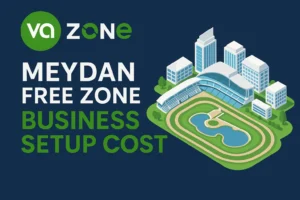
Meydan Free Zone Business Setup Cost (2025)—Affordable & Fast Setup Guide
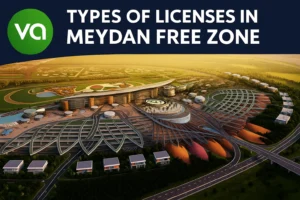
Explore 5 Powerful License Types in Meydan Free Zone—Find the Best Fit for Your Business
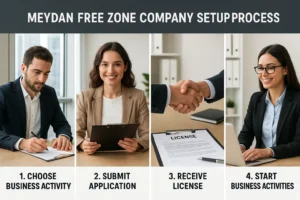
Meydan Free Zone Company Setup Process (2025)—Step-by-Step Guide
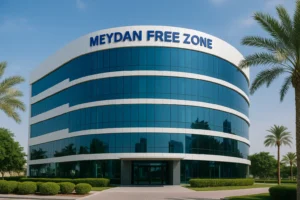
Meydan Free Zone vs Other Free Zones in Dubai (2025) – Which One Is Best for You?
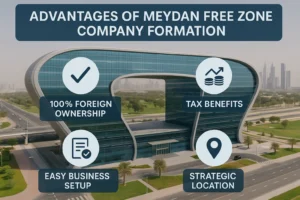
Top Benefits of Setting Up in Meydan Free Zone (2025)—Tax-Free & Strategic Location
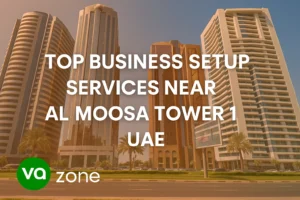

Best Business Consultant Near Al Moosa Tower 1 Dubai—Expert Setup with VA Zone
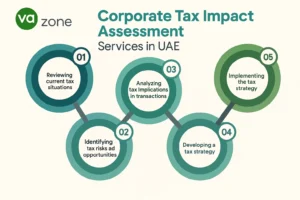



Corporate Tax Return Filing in UAE Made Easy | Step-by-Step Guide 2025








Fujairah Free Zone & Company Formation in Fujairah Creative City

Sharjah Media City Free Zone – Get Your Trading License & Business Setup in SHAMS

